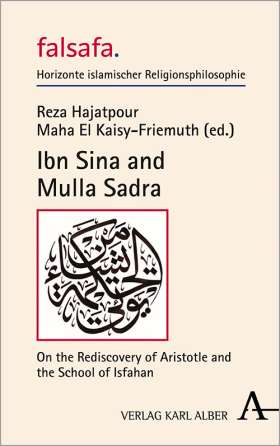
Kadivar, Mohsen. “Rational Perception in Ibn Sina and Mulla Sadra” in Ibn Sina and Mulla Sadra: on the rediscovery of Aristotle and the School of Isfahan. Reza Hajatpour and Maha Elkaisy-Friemuth (ed.). Falsafa: Horizonte islamischer Religionsphilosophie, Band 3. Freiburg; München: Verlag Karl Alber, 2021. Pp. 85-99.
Book description: Turning points in Islamic philosophy: Two philosophers and mystics who contributed significantly to the elaboration of the theology and mysticism of Sufism are Abū Alī al-Husain ibn Abdullāh ibn Sīnā (980-1037), called Avicenna, and Ṣadr ad-Dīn ašŠīrāzī, known as Mullā Ṣadrā (1572 -1640). The latter develops his theological thinking in dialogue with Avicenna’s philosophy, among other things, and innovatively continues in his own way the tradition he started to bring together Greek and Islamic thought.
“Mohsen Kadivar’s article “Rational Perception in Ibn Sina and Mulla Sadra” zeroes in on the controversial concept of rational perception in Ibn Sina and Mulla Sadra’s receptive oeuvres, defining it as the complex abstraction, combination and production of universals. He elucidates Ibn Sina’s reflections on reflections or rational perception in terms of the dominant Aristotelian and Neoplatonic interpretation of his works (as opposed to Mulla Sadra’s mysticism), beginning with a discussion of the human soul and its relationship to the “Active Intellect”. The role of sense perception, along with its relationship to intuition, features prominently here. Kadivar emphasizes the break with Ibn Sina in his discussion of Mulla Sadra’s view of a certain mutability of the human soul and the three different worlds in which it exists. Emanation is posited as an existentialist relationship mired in activity rather than passivity. Kadivar concludes the paper by tracing the legacy of Mulla Sadra in the more recent history of Islamic philosophy. He reflects on the pernicious effects that the mystical concept of annihilation has had for Muslim elites focused on externalization of philosophy, instead pleading for a reconstruction of Islamic philosophy based on the internal faculties of the human soul (mired as they are contingency) along with a form of critical reason.” (R. Hajatpour, Introduction, p.13)

